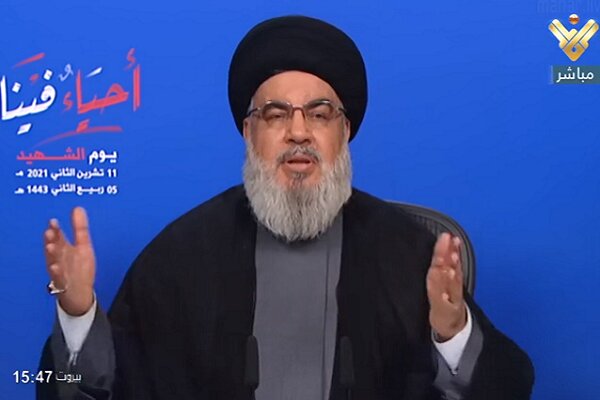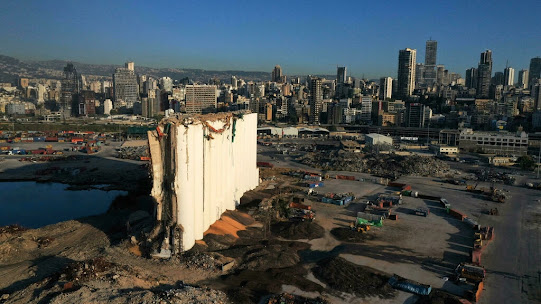AFP -
A year after the murder of Lebanese intellectual and Hezbollah critic Lokman Slim, his family is still searching for accountability in a country where crimes often go unpunished.
"We really need justice for Lokman," his widow Monika Borgmann told AFP from their home in the southern suburbs of the capital Beirut, days before the first anniversary of his killing.
If his murder goes unpunished, it would be like "giving the green light to the killers, whoever they are, to continue" their crimes, she said, amid stalled investigations into his murder.

© ANWAR AMRO
A secular activist from a Shiite family, 58-year-old Slim was found dead in his car on February 4 last year, a day after his family reported him missing.
His body was found in southern Lebanon -- a stronghold of the Iran-backed Hezbollah movement -- but the culprits have yet to be identified.
An outspoken activist and a researcher passionate about documenting the civil war that raged from 1975-1990 in Lebanon, Slim was a divisive figure. His sway over foreign diplomats in Lebanon often sparked the ire of Hezbollah and its loyalists.

© HASAN TRAD
In several televised interviews, Slim accused the group of taking Lebanon hostage on behalf of its Iranian patrons.
In one of his last TV appearances, he accused the Syrian regime of having links to the ammonium nitrate shipment that caused the catastrophic explosion at Beirut's port in August 2020.
Slim's family has received no updates from the authorities since investigations into his murder started.
This is not unusual for a country where even investigations into the Beirut port blast have yet to identify a single culprit -- a year and a half after the explosion destroyed swathes of the city.

© JOSEPH EID
- 'Information-gathering' -
The judiciary is still working on gathering evidence from security agencies over Slim's murder, said a judicial source, explaining that investigations are still at an "information-gathering phase".
They are yet to reach any key conclusions because not all security agencies have provided investigators with the necessary information, the same source added.
Borgmann, Slim's widow, said that the family has been left in the dark.
"We don't really know where we are going," she said, expressing doubts over whether any progress will ever be made.
Slim's family has called for an independent, international probe into his murder. It is a demand that Borgmann said is within reach after United Nations experts last year called for a credible and impartial investigation.
"The government should consider requesting international technical assistance to investigate the killing of Mr. Slim," UN human rights experts said in March.
Lebanese politicians and media personalities have suspected Hezbollah's involvement in his murder, but Slim's family has never publicly accused the party of his killing.
"Of course, I have my opinion who is behind (the murder)," said Borgmann, a film director, originally from Germany.
"But for me it's not really enough to point the finger at anybody and... stop there," she added.
"We need proof and we need accountability," she said, expressing hopes his killers will be jailed.
Borgmann said Hezbollah had threatened Slim several times, most notably in December 2019.
A group of people attacked his home in the southern suburbs of Beirut, plastering Hezbollah slogans and messages on the walls, calling him a traitor and warning that his "time will come".
At the time, Slim said he would lay the blame squarely on the shoulders of the Shiite Hezbollah and Amal movements should anything happen to him or his family.
"Lokman said it himself," Borgmann said.
- 'Believe in justice' -
There have been at least 220 assassinations and murder attempts since Lebanon's independence in 1943 until Slim's killing last year, according to Beirut-based consultancy firm Information International.
Investigations into these murders have rarely yielded results due to political interference or lack of evidence.
After he was killed, Slim's family launched a foundation in his name that is devoted to studying political assassinations in Lebanon and in the region.
"Political assassinations played a major role in controlling political life in Arab societies," said Hana Jaber, the foundation's director.
They create "imaginary barriers... that deter societies from thinking freely or producing alternative political, societal and cultural projects".
As a result, the foundation created in Slim's honour will work to counter the culture of impunity around political assassinations and "break the isolation of those who are under threat", Jaber said.
For Borgmann, the foundation will serve to preserve Slim's legacy.
"The fight against the culture of impunity has always been at the centre of our work," she said.
"Now we need to do it without him, but for him."
lar/aya/jsa/pjm














:quality(70)/cloudfront-eu-central-1.images.arcpublishing.com/thenational/7T5F4YQYEQBVKNU5YZSQQ5VIV4.jpg)
:quality(70)/s3.amazonaws.com/arc-authors/thenational/0c776a17-4aec-4e4c-95b2-489017fb7875.png)
:quality(70)/cloudfront-eu-central-1.images.arcpublishing.com/thenational/DWZPSM45VZFT4FXEGOSQOQ6H34.jpg)
:quality(70)/cloudfront-eu-central-1.images.arcpublishing.com/thenational/TLNWH3VCLUPIGEDXWWQ2BPM4FA.jpg)
:quality(70)/cloudfront-eu-central-1.images.arcpublishing.com/thenational/4C6FCDMEQQAMEO2KMDIFBMCW7A.jpg)
:quality(70)/cloudfront-eu-central-1.images.arcpublishing.com/thenational/PSWKK37PALBM4EIONZSRLOMAQ4.jpg)
:quality(70)/cloudfront-eu-central-1.images.arcpublishing.com/thenational/BGTZGGZXHTWHB5LUSHSSUCNXOY.jpg)
:quality(70):focal(3967x1565:3977x1575)/cloudfront-eu-central-1.images.arcpublishing.com/thenational/4WEQMWNPQELRFVRFLGORMJMIL4.jpg)
:quality(70)/cloudfront-eu-central-1.images.arcpublishing.com/thenational/VNO2BRIXQPWAGRTTH5VRM7CORQ.jpg)
:quality(70)/cloudfront-eu-central-1.images.arcpublishing.com/thenational/A655IS7LE7CBJDHTLBCSQ3PECY.jpg)
:quality(70)/cloudfront-eu-central-1.images.arcpublishing.com/thenational/AA3W34T6GLCYHWLVD4U6AJX7VM.jpg)
:quality(70)/cloudfront-eu-central-1.images.arcpublishing.com/thenational/ORKIV6RZWXCTHDT2LULCBXX52Y.jpg)
:quality(70):focal(-5x-5:5x5)/cloudfront-eu-central-1.images.arcpublishing.com/thenational/2QTOLXASPGRVTESHZOUOOFAVXU.jpg)
:quality(70)/cloudfront-eu-central-1.images.arcpublishing.com/thenational/2GA3JA4XNUBJ3ED5NQPOGVHYD4.jpg)
:quality(70)/cloudfront-eu-central-1.images.arcpublishing.com/thenational/Y6OMWWFJ2RUGJ7BX7VUODWMUHI.jpg)
:quality(70)/cloudfront-eu-central-1.images.arcpublishing.com/thenational/H5QVJB3OO6R3LSF2MVIGSDQ7PY.jpg)
:quality(70)/cloudfront-eu-central-1.images.arcpublishing.com/thenational/2OSCRGMATC2YADRKXO262UH22Q.jpg)
:quality(70)/cloudfront-eu-central-1.images.arcpublishing.com/thenational/PK5RA4XJXRTJYVHDXELJ5KEWII.jpg)
:quality(70)/cloudfront-eu-central-1.images.arcpublishing.com/thenational/7NPXZFE37KX2JTSHQQ2C3LY53M.jpg)
:quality(70)/cloudfront-eu-central-1.images.arcpublishing.com/thenational/EHIYVX3Z7MM2JRX6BQCTBZJZ3A.jpg)
:quality(70)/cloudfront-eu-central-1.images.arcpublishing.com/thenational/ZL2IKALB477XCWAW4SROOWVVVA.jpg)
:quality(70)/cloudfront-eu-central-1.images.arcpublishing.com/thenational/OWEN7VPWUWMRNOFDP4XAXALVJQ.jpg)
:quality(70)/cloudfront-eu-central-1.images.arcpublishing.com/thenational/EQZOVI6YX5FFTZZ6ZU2A26NATQ.jpg)
:quality(70)/cloudfront-eu-central-1.images.arcpublishing.com/thenational/3TKFPCDS5EUDJ2BFINAUXOQ4ZQ.jpg)
:quality(70)/cloudfront-eu-central-1.images.arcpublishing.com/thenational/FIKXSWMFZDAWX2VPFWTO7Q4CXQ.jpg)
:quality(70)/cloudfront-eu-central-1.images.arcpublishing.com/thenational/KI6Z52Y6FLJW6QV5XKDZZB2FBI.jpg)
:quality(70)/cloudfront-eu-central-1.images.arcpublishing.com/thenational/NU6DFGNXKO3TQUEQ4ZVKISD7NU.jpg)
:quality(70)/cloudfront-eu-central-1.images.arcpublishing.com/thenational/IF32D33BQXT3TSLTPR2L6DYDGI.jpg)
:quality(70)/cloudfront-eu-central-1.images.arcpublishing.com/thenational/MLCJQLE7VUYRHC26K2EQX7E6GA.jpg)
:quality(70)/cloudfront-eu-central-1.images.arcpublishing.com/thenational/S6SJ6OJDAZTEURIJNOBVDXSQRE.jpg)
:quality(70)/cloudfront-eu-central-1.images.arcpublishing.com/thenational/6QEELNRZNBQXEHLIHZHRL67PII.jpg)
:quality(70)/cloudfront-eu-central-1.images.arcpublishing.com/thenational/LHPWETGHMFWSDO6NREKGZ4AFZ4.jpg)